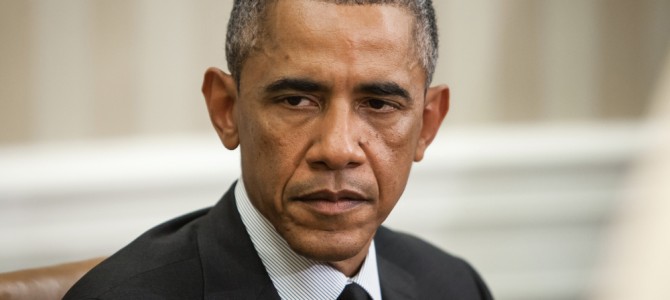
Legal commentator Jeffery Toobin’s recent piece in The New Yorker, “The Threat to Obama from the Courts,” deserves nomination for Best Hack Performance in a Presidential Supporting Role. Toobin makes clear his take on the final years of this presidency: Obama’s aims are laudable and good for the nation, while conservatives’ aims are suspect and center mainly on tarnishing Obama’s legacy and denying Mount Rushmore a chisel-ready project for January 2017.
In making his case, Toobin all but declares checks and balances on government power are not a crowning feature of America’s constitutional formula, but cumbersome relics handed down by Founders who surely would have done better if they had foreseen a leader like Obama.
Before discussing the legacy-threatening courts, Toobin raises and dismisses Congress as a potential check on the president. He explains that fractious Republicans won’t be able to pull together or overcome Democrat filibusters to pass significant legislation. Even if they could, Obama would veto anything he doesn’t like. Therefore, Congress doesn’t play large in this picture.
All Politics, No Substance
Toobin’s prediction may prove accurate, but it’s beside his point. Congress’s inability to enact a conservative agenda is different from its ability—or lack of ability—to block Obama’s liberal agenda. Toobin spends no time considering the tools Congress could, if so inclined, deploy to challenge the president: investigations, oversight hearings, budget restrictions on controversial initiatives, rejecting extreme nominees, and so forth. Dispirited conservatives might argue that Congress won’t effectively check the president because Senate Majority Leader Mitch McConnell and House Speaker John Boehner seem not to have the stomach for a fight.
With Congress discounted, Toobin quickly takes aim at his real target: a constitutionally independent and engaged judiciary. “But Obama can’t veto court decisions, and his political adversaries have, understandably, turned their attentions to the judiciary.” Got that? Toobin announces that his guided tour of important national litigation is not really about serious legal and policy challenges raised by serious entities like state governments, major industries, or aggrieved citizens. It’s more a campaign to thwart Obama’s legacy, opportunistically waged in the courts by “political adversaries.”
Toobin’s tour makes port at Obamacare, immigration, net neutrality, and climate change. Throughout, he scrupulously avoide any fair or balanced description of the issues.
Those Darned Courts and Their Concern for Legality
Toobin describes the plaintiffs’ argument in King v. Burwell, an Obamacare case, as asserting that “four words in the text of the statute” mean that people in 34 states are ineligible for the Affordable Care Act’s federal subsidies. He discernibly shouts, “That’s ridiculous! What could be more trifling than four little words?” Presumably, Toobin would argue for executive flexibility in interpreting the difference between “the Secretary shall” and “the Secretary shall not” because after all, the difference is but a single word.
He renders the controversy over Obama’s immigration orders thusly: “Early this year, President Obama used his executive authority to expand his program to allow certain undocumented immigrants who came to the country as children to remain here without the threat of deportation.” Well. It’s unfortunate 26 states are making a mountain of such a molehill. The president just “used his authority” to spare certain children deportation.
Somewhere in his editing and revising, Toobin must have removed an accurate description of major legal changes Obama’s immigration actions have caused, changes that encompass 5 million immigrants: granting them work status, Social Security numbers, and welfare benefits. He also deleted mention of the 22 recorded statements where Obama admitted he doesn’t have the authority to do what he just did. Toobin did see fit, however, to retain his description of the judge hearing the case, and the entire Fifth Circuit Court of Appeals, as “hostile” to Obama.
In the Toobin tour, net neutrality is a big win for consumers. Utility-style regulations will prevent big companies from jerking around viewers and content providers alike. It’s not an audacious power grab, unauthorized by Congress, to control the Internet, which doesn’t seem broken. There’s apparently no good reason to oppose it. Still, Toobin sadly notes, a wave of legal challenges is surfacing even before the new regulations go into effect. What could be more mean-spirited?
Apparently Voters Don’t Matter, Either
Climate change is a fitting climax for Toobin’s tour of the battle against Obama’s legacy. “Industry representatives have brought multiple cases challenging virtually everything the Environmental Protection Agency has done to enforce the Clean Air Act.” That’s all our poor president is doing—enforcing the Clean Air Act!
Toobin assumes his audience is too dim know carbon is not a conventional pollutant. It doesn’t make anyone cough or wheeze or get asthma. It is a plant nutrient that gives us a greener earth. It matters only if the alarmist version of global warming dogma is correct. The EPA’s carbon rules will shut down domestic coal power, choke affordable energy, and harm millions of economically marginal Americans with much higher energy costs. Those aren’t issues to consider, though. Only the spite of “industry representatives” for clean air merits notice.
The most perverse thing about Toobin’s piece is the constitutional elephant in the room. Obama’s unilateral agenda is enormously controversial. Public opinion tilts against most of it. Congress has not enacted it. Obama was just repudiated in historic midterm elections that gave Republicans their largest majorities in nearly a century. But to activist scribes like Toobin, it’s as natural as the genetically unmodified seeds of heirloom tomatoes that a liberal president should steer the country wherever he wants.
It isn’t remarkable that a rebuked, lame-duck president should launch initiatives to rewrite his healthcare law, transform immigration law, seize the Internet, and commandeer the U.S. energy sector without congressional agreement. No, what Toobin finds troubling is that judges might have the effrontery to stand in his way. After all, Obama has a transformative legacy to secure.








